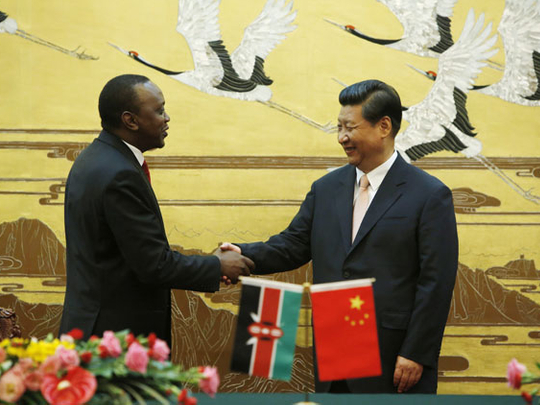
Nairobi: Snubbed by the United States and charged by the International Criminal Court, Kenyan President Uhuru Kenyatta has headed east and scored $5 billion (Dh18.3 billion, 3.7 billion euros) of infrastructure deals with China.
Just months into his presidency, Kenyatta has highlighted China’s growing economic clout in the region by choosing to make Beijing the destination of his maiden state visit.
As an astute, western-educated economist and businessman, Kenyatta has all the more reason to work on ties with China given that he was snubbed by Barack Obama during the US leader’s trip to the African continent last month.
“China’s importance to Africa cannot be underrated. China is our biggest partner in development,” tweeted Kenyatta, who is wanted on charges of crimes against humanity by the International Criminal Court, as he touched down in Beijing at the beginning of the week.
The latest deals include a batch of energy projects and the building of a new railway track from Kenya’s Indian Ocean coast right through to its western border with Uganda.
Kenyatta also tweeted pictures of himself and his wife strolling along the Great Wall of China in the company of his Chinese counterpart and host Xi Jinping.
“We welcome the investment in key sectors of our economy,” Kenyatta said after the signing in Beijing on Monday.
He pledged to further bolster “political and economic partnerships” with China.
China has long been a vital partner for most African countries, Kenya among them. China’s official news agency Xinhua said that at $2.84 billion in trade Beijing is the east African nation’s second-largest commercial partner.
Ahead of Kenya’s March elections, Washington warned Kenyans that “choices have consequences”, in an apparent caution against voting for Kenyatta.
After Kenyatta’s win, Obama, whose family on his father’s side is Kenyan, bypassed Kenya in favour of neighbouring Tanzania when he came to east Africa in early July.
Kenyan banker and analyst Aly-Khan Satchu said this may have backfired.
“I think the Western nations are finding the choices they made are having consequences in regard to the relationships that Kenya is seeking, China being the latest example,” he told the BBC.
The red carpet treatment and 21-gun salute that the Kenyan leader received in China contrasts starkly with the reception he got in London, where he was invited to attend a conference on Somalia in May.
In Britain, Kenya’s biggest bilateral trading partner, Kenyatta got a polite welcome but there was no opportunity for him to pose for the press alongside David Cameron.
Britain is among European Union countries which have said they will keep contacts with Kenyatta to a minimum.
Kenyatta - along with his deputy William Ruto - faces a potentially long drawn-out hearing at the ICC for his alleged role in orchestrating the violence that followed the disputed 2007 elections.
The ICC hearing for Kenyatta, son of Kenya’s founding father Jomo Kenyatta, is set to open November 12.
Kenya focuses ‘on opening new markets’ -
Kenyatta also visited Russia on his way to China and will stop in Dubai on his way back to Kenya.
“The visits to Russia and China are important to Kenya in the context of the policy to look ‘East’,” presidential spokesman Manoah Esipisu said ahead of the tour.
That strategy means “a focus on opening new markets or deepening existing relations in the traditional Indian Ocean rim, other countries such as Australia and Singapore, and the emerging constituency of powers from developing countries known as Brics - Brazil, Russia, India, China and South Africa,” Esipisu added.
In Moscow, Kenyatta urged Russian businessmen “to take advantage of our strategic location as the gateway to the East African Community”.
One potential blot in China-Kenya relations could be the ivory trade.
Among the deals signed is one reported to cover “wildlife protection”, and Kenyatta’s wife Margaret is spearheading an anti-poaching drive aimed at saving elephants and rhinos.
Demand for ivory and rhino horn comes primarily from China, conservationists say, and many accuse the Chinese authorities of not doing enough to stop the illicit ivory trade.












